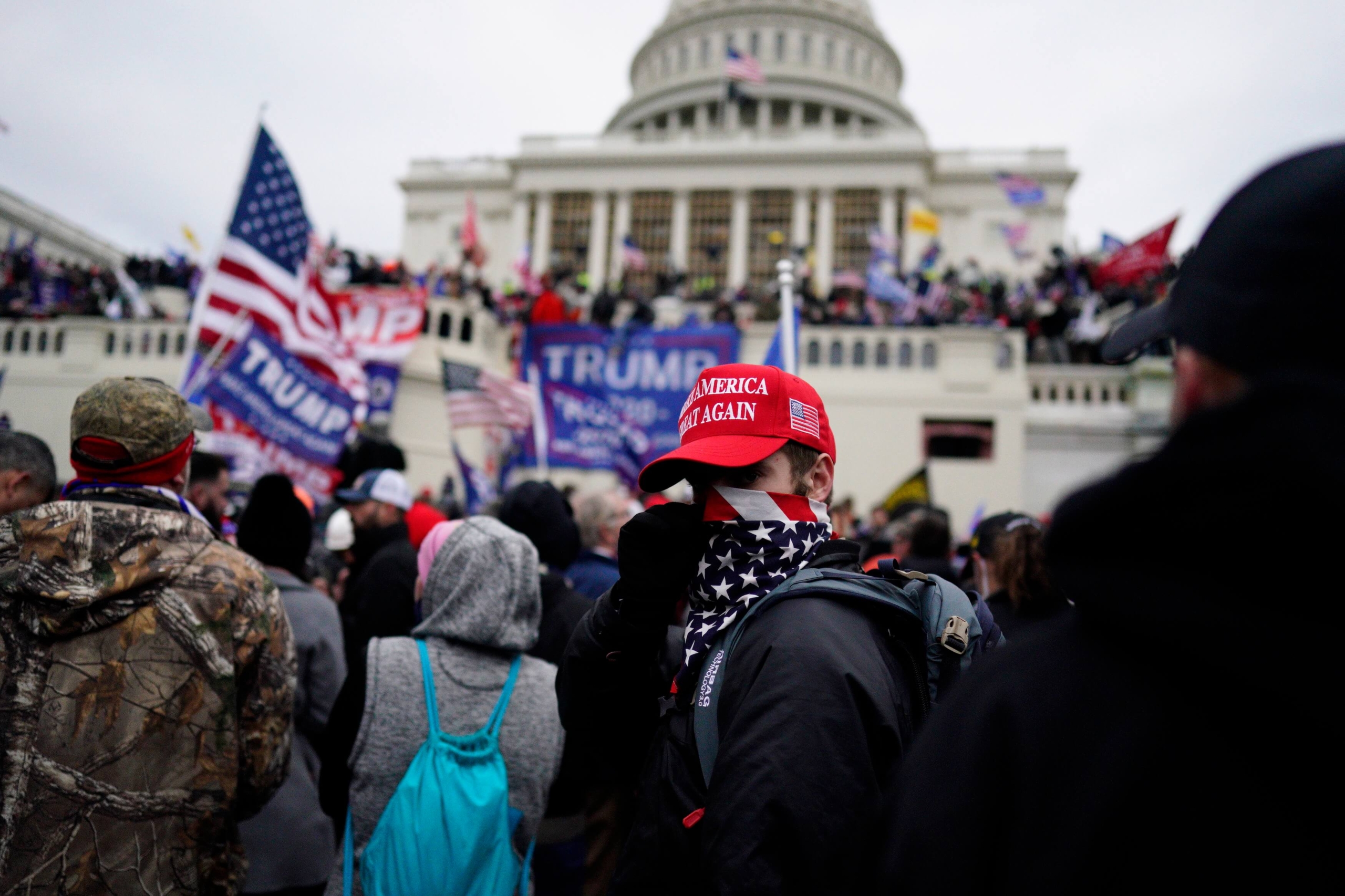Against my better judgment, I attempted to drive down to Capitol Hill on Wednesday, Jan. 6, even as texts and WhatsApp messages from friends overseas lit up my phone asking if I was okay—the headlines had already reached them. I needed to see the chaos with my own eyes to believe that it could be happening: That in 2021, with a new president-elect and a woman vice-president about to take office, neo-fascists could be storming the seat of the U.S. government in rage and violence.
As a joint session of Congress was in the process of certifying Joe Biden’s victory, mobs of angry, weapon-wielding Trump supporters seeking to overturn the election results, incited by their president, climbed the scaffolding of the U.S. Capitol and overran a surprisingly low number of Capitol police to occupy the Senate chamber. They vandalized offices—including Speaker Nancy Pelosi’s—looted art and furniture and took selfies. It was destruction and violence largely driven by hate. And though terrorism is a word that often gets used to describe violence abroad, what happened at the Capitol on Wednesday was nothing short of that.
I could only get so close in my car, and I decided against walking any closer. From the driver’s seat, I could only see hoards of bodies in motion, American flags, Trump flags and confederate flags waving above them. Sirens blared as I drove home. At 5:30 p.m. came the curfew alert, and a state of emergency declared until Inauguration Day on Jan. 20. Then came a deeply unsettling video of Trump addressing the rioters: “Go home, we love you, you’re very special,” followed by a 12-hour Twitter suspension of his account. What I would only later learn was the human toll of those few hours: The injuries and deaths of a number of people, including a police officer bludgeoned to death by a fire extinguisher.
“America as I’d known it and believed it to be no longer existed. Had it ever?”
All of it seemed surreal, like something that happened elsewhere; perhaps in one of the Trump-designated “shithole countries” where many of our families emigrated from, including my own, that had been deemed dangerous and intolerant and antithetical to democracy and law and order. In fact, that danger and intolerance unfolded just 10 minutes away as one of the central tenets of democracy—the peaceful transfer of power—was met with upheaval.
I’m only visiting D.C. for the holidays; home is now in Brooklyn. But I grew up in the D.C. area, came of age in the Clinton years, came out in the Bush years, moved in with a partner during during Obama. In the middle of the night of the 2016 election, I woke up to find my then-girlfriend awake, staring at the news on her phone. “Do we know yet?” I asked.
“He won,” she said, and started to cry.
I wailed alongside her, not out of sadness or disappointment that this wasn’t what America was, but rather out of fear that this was indeed America. That America as I’d known it and believed it to be no longer existed (had it ever?). That night was, for me, the beginning of a terror that has since manifested in response to a number of incidents of hate: The Muslim ban; Charlottesville; the killing of George Floyd and other acts of police brutality that have taken so many Black lives; the designation of a deadly pandemic as a hoax; and, of course, this entire week.
At the same time, that election night was an ending of America as a place of openness and acceptance, of freedom of expression, of peaceful protest.
“Many are calling for Trump to be impeached in the final two weeks of his presidency. But amid these calls is the troubling reality that 74 million Americans voted for him.”
I’ve participated in a number of peaceful marches toward the Capitol: for Palestinian liberation, for LGBTQ2S+ equality, for an end to the Iraq war and the Women’s March four years ago. That morning, we’d boarded a bus at 4:30 a.m. to take us from Atlantic Terminal in Brooklyn to Washington. We sported our pink hats and held our “Not My President” signs against the windows, cars honking in support. Upon arriving, we spilled out of the bus and onto the streets of D.C. That year, the Washington Mall swelled with women. This week, it swarmed with neo-fascist Proud Boys.
Now, many are calling for Trump to be impeached in the final two weeks of his presidency. But amid these calls is the troubling reality that 74 million Americans voted for him, that tens of millions continue to believe the election was stolen. I’m not sure what to do with all that, or how to reconcile it other than to live with it, to hope that, as we head into a new year and a new administration, some semblance of America as we once knew it, or at least thought it to be—the America that drew my family from their home country on the promise of something better—might resurface.


 Why you can trust Xtra
Why you can trust Xtra


